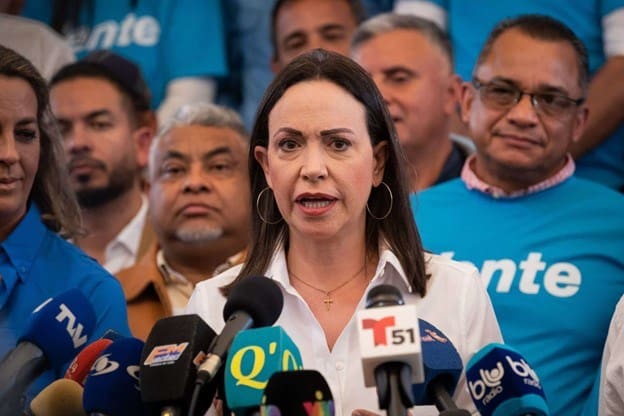1 de febrero 2024

“NicaraguAmor” Cultural Caravan for Nicaraguans in the USA

PUBLICIDAD 1M
PUBLICIDAD 4D
PUBLICIDAD 5D
The “Chavista” forces, by tossing this hot potato into the hands of the opposition groups, play their usual game of dividing the pro-democracy factors

Venezuelan opposition leader Maria Corina Machado. Photo: EFE / Confidencial
The political-electoral panorama in Venezuela, where presidential elections are scheduled for 2024, remains marked by two large questions. The first was revealed on Friday, January 26, with the Venezuelan Supreme Court’s decision to ratify the disqualification of Maria Corina Machado, the leading opposition candidate, and also leave two-time candidate Henrique Capriles out of the game. This decision, which is more political than legal as typical of regimes where one group has concentrated power, lays bare the official strategy: there will be no competitive elections in Venezuela in 2024.
Months before, I wrote in the Venezuelan news-site El Estimulo about the inability of Maduro’s Chavista Party to commit political suicide. Allowing Machado to compete in an election [against current President Nicolas Maduro] would amount to an act of Harikiri for those who have appropriated power in Venezuela. The Chavistas have one and only one central strategy, which consists in remaining glued to power, no matter what the cost to society and the country.
The last weeks of 2023 and the first of 2024 have witnessed the consolidation of Maria Corina Machado as the principal figure for the democratic opposition in Venezuela. The uncontested backing of the Unified Platform, the huge acceptance of the United States, together with a growing validation for her among Venezuelans have combined with other factors to accelerate Machado's growth after her overwhelming triumph in the opposition primaries of October 22, 2023.
Her evolution in terms of public opinion, and her international recognition as the principal favorite to win a presidential election, if it were to be held under fair conditions, presented the principal dilemma for Maduro’s forces in 2024. To lift the ban on Machado and let her compete would be a kind of Harakiri; to leave the ban in place and hence leave her out of the presidential race would mean invalidating the elections, both within and outside of Venezuela, and as such opening the way to declare illegitimate the eventual reelection of Nicolas Maduro, for a term that would extend to 2030.
In the face of this dilemma, the government has chosen the second option. Leaving Machado out opens the door to having this year’s elections end without offering Nicolas Maduro the legitimacy he already wore out in 2018. However, it’s also true that the international democratic community, with the United States at the head, seems to have relegated to second place the topic of Venezuela’s authoritarianism and the absence of the Rule of Law, in order to give priority to a direct dialogue with the Venezuelan Miraflores Palace [presidential offices] and the reactivation of the Venezuelan oil industry, in the face of a complex international panorama.
The combination of conflicts that are affecting, directly or indirectly, the producers of gas and crude oil in other regions of the world, means that Venezuela returns to its former condition of a geographically close supplier with huge potential. Pragmatic policies have ended by imposing themselves in the United States and the countries of Western Europe.
Hence, the Chavistas have revealed their final decision: not only through the high court’s ruling, but also through specific declarations of Jorge Rodriguez and Hector Rodriguez [respectively head of the Venezuelan National Assembly and governor of Miranda State], added to what powerful deputy Diosdado Cabello has already been indicating. These declarations leave it clear that the different currents of Maduro’s party all concur with the decision to block the way for Maria Corina Machado.
The ball, as they say, has now been passed to the opposition court, particularly to the hands of Maria Corina Machado. Now is really the moment for the candidate to highlight her personal strength and strategic capacity.
Given that the Supreme Court’s decision has already closed the door on any institutional path for reversing the ban on her candidacy – a restriction that is doubtless irritating and unconstitutional, but nonetheless real – the central dilemma now lies with the opposition factions. Will Maria Corina dig in her heels and insist on registering with the Electoral Board as a candidate, although she’s been disqualified? Will she accept what happened and designate another candidate to bear her flag, betting that such a person could register, and she could offer her public backing?
Many other questions could be added, but these two are representative of the dilemma now facing Machado and the Unified Platform. By tossing this hot potato into the hands of the opposition, the Chavistas are playing their usual game of dividing the pro-democracy groups.
What does seem to be off the table as a strategy is the “road of no return.” By turning out in massive numbers last year to vote in the opposition primary – in a way they didn’t do for the government referendum regarding the Venezuela-Guyana territorial dispute over Esequibo – Venezuelan society has given a clear message: they’re willing to go out on the street, but only to vote. Maria Corina Machado has insisted that nothing will block her from the electoral route. Now it’s up to her to activate her plan for that.
This article was published in Spanish in Confidencial and translated by Havana Times. To get the most relevant news from our English coverage delivered straight to your inbox, subscribe to The Dispatch.
PUBLICIDAD 3M
Periodista y politólogo venezolano. Doctor en Ciencia Política por la Universidad Simón Bolívar, (Caracas). Investigador asociado de la Universidad Católica Andrés Bello. Fundador y director de Medianálisis.
PUBLICIDAD 3D